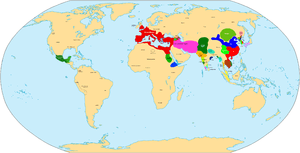250
| Millennium: | 1st millennium |
|---|---|
| Centuries: | 2nd century · 3rd century · 4th century |
| Decades: | 220s · 230s · 240s · 250s · 260s · 270s · 280s |
| Years: | 247 · 248 · 249 · 250 · 251 · 252 · 253 |
| 250 by topic | |
| Politics | |
| State leaders – Sovereign states | |
| Birth and death categories | |
| Births – Deaths | |
| Establishment and disestablishment categories | |
| Establishments – Disestablishments | |
| Gregorian calendar | 250 CCL |
| Ab urbe condita | 1003 |
| Assyrian calendar | 5000 |
| Bengali calendar | −343 |
| Berber calendar | 1200 |
| Buddhist calendar | 794 |
| Burmese calendar | −388 |
| Byzantine calendar | 5758–5759 |
| Chinese calendar | 己巳年 (Earth Snake) 2946 or 2886 — to — 庚午年 (Metal Horse) 2947 or 2887 |
| Coptic calendar | −34 – −33 |
| Discordian calendar | 1416 |
| Ethiopian calendar | 242–243 |
| Hebrew calendar | 4010–4011 |
| Hindu calendars | |
| - Vikram Samvat | 306–307 |
| - Shaka Samvat | 171–172 |
| - Kali Yuga | 3350–3351 |
| Holocene calendar | 10250 |
| Iranian calendar | 372 BP – 371 BP |
| Islamic calendar | 383 BH – 382 BH |
| Javanese calendar | 128–129 |
| Julian calendar | 250 CCL |
| Korean calendar | 2583 |
| Minguo calendar | 1662 before ROC 民前1662年 |
| Nanakshahi calendar | −1218 |
| Seleucid era | 561/562 AG |
| Thai solar calendar | 792–793 |
| Wikimedia Commons has media related to 250. |

The world in 250
Year 250 (CCL) was a common year starting on Tuesday (link will display the full calendar) of the Julian calendar. At the time, it was known as the Year of the Consulship of Traianus and Gratus (or, less frequently, year 1003 Ab urbe condita). The denomination 250 for this year has been used since the early medieval period, when the Anno Domini calendar era became the prevalent method in Europe for naming years.
Events
By place
Roman Empire
- A group of Franks penetrate as far as Tarragona in Spain (approximate date).
- The Goths under king Cniva invade Moesia. They cross the Danube and lay siege to Novae and Marcianopolis.
- Battle of Augusta Traiana. The Romans lose the battle against the Goths
- Cniva lays siege to Philippopolis (modern Plovdiv). After a long resistance, Cniva conquers the city and slays its one hundred thousand inhabitants.
- The Alamanni drive the Romans from the modern area of Donau-Ries.
- An epidemic of smallpox begins in Ethiopia, moves into Egypt and the Roman colonies in North Africa, and spreads through the Roman Empire. Named the Plague of Cyprian after St. Cyprian, bishop of Carthage.
Africa
Asia
- The Kofun Period begins in Japan.
- The Kushan Empire collapses.
- The earliest Chinese references to a device known as "emperor's south-pointing carriage" date to this period.
America
- Teotihuacán is rebuilt as a four-quartered cosmogram by Zapotec architects brought from Monte Albán in Oaxaca.
- Classic period of Mesoamerican civilization begins.
By topic
Arts and sciences
- Diophantus writes Arithmetica, the first systematic treatise on algebra.
- Family Group, traditionally called the Family of Vunnerius Keramus, is made. It was later placed in Brescia Cross. It is now kept at Museo Civico dell'Etá Cristiana, Brescia (approximate date).
- Battle between the Romans and the Barbarians, detail of the Ludovisi Battle sarcophagus, found near Rome, is made. It is now kept at Museo Nazionale Romano (approximate date).
- Igel Column is erected (approximate date).
- After 250 - Temple of the Feathered Serpent, Teotihuacan, the Ciudadela, Teotihuacan, Mexico, is built. Teotihuacan culture.
Religion
- Emperor Decius institutes the persecution of Christians in an attempt to restore the religion of Rome. Pope Fabian is one of the first martyrs.
Births
- March 31 – Constantius Chlorus, Roman Emperor and father of Constantine the Great
- Galerius, Roman Emperor (approximate date)
- Maximian, Roman Emperor (approximate date)
- Zuo Si, writer and poet of the Jin Dynasty (d. 305)
Deaths
- January 20 – Pope Fabian
- Ambrose of Alexandria, Christian writer (approximate date)
- Nagarjuna, founder of Mahayana ("Great Vehicle") Buddhism
- Saint Denise, Christian martyr
- Saint Mercurius, Christian martyr
- Sun Li, general of Cao Wei
- Zhu Ju, general of the Kingdom of Wu (b. 194)
References
This article is issued from Wikipedia - version of the 7/27/2016. The text is available under the Creative Commons Attribution/Share Alike but additional terms may apply for the media files.